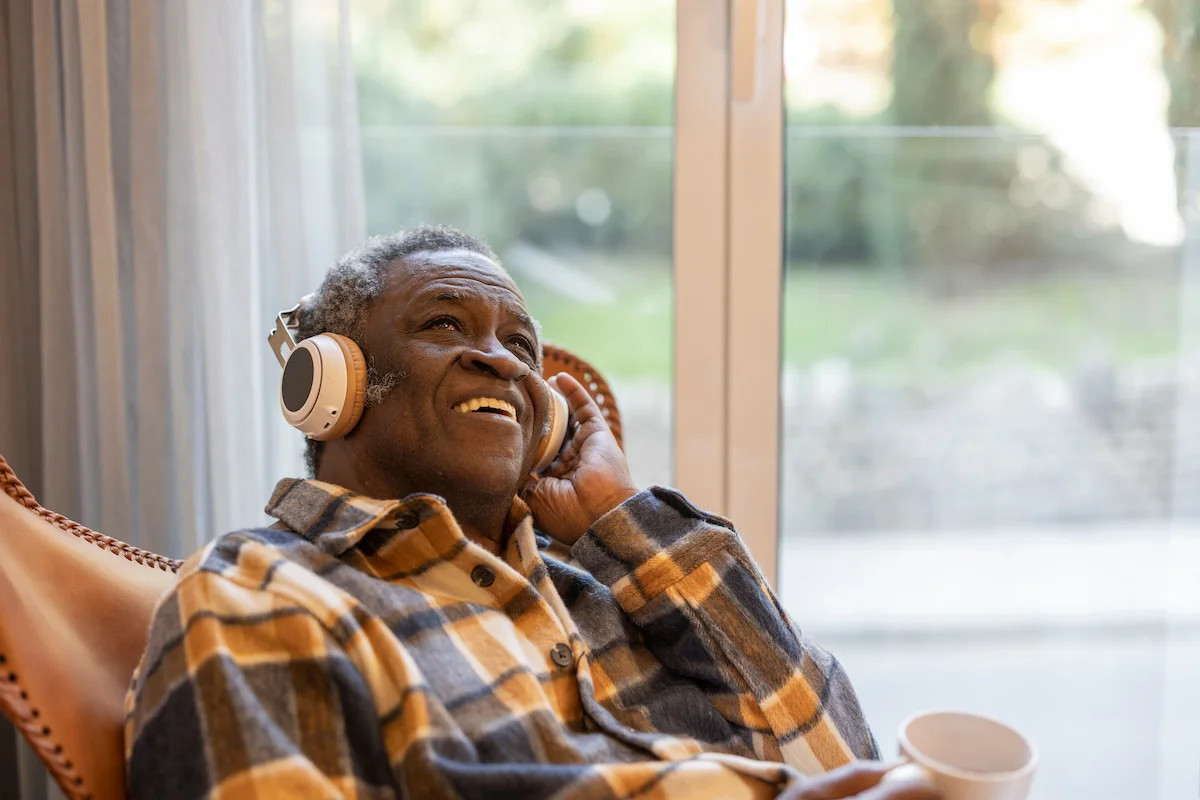
Music Therapy for Dementia: Unlocking Emotional Connections
In the United States alone, more than six million adults live with dementia, a startling statistic that underscores the pressing need for compassionate and effective care approaches. With so many pharmaceutical choices available on the market, you might be wondering how something as simple as music therapy for dementia could be beneficial.
At the Mission at Agua Fria Senior Living, we welcome holistic and pharmaceutical care approaches, finding the best combination for each resident. In this post, we’ll look closer at the connection between the two approaches and how music therapy plays a pivotal role in caring for those affected by dementia.
Defining Dementia
In short, dementia is the loss of cognitive functioning, thinking, remembering, and reasoning. A more lengthy definition would tell you there is a progressive/persistent loss of intellectual functioning, often paired with a personality change, that is a result of brain disease.
Many memory disorders fall under the term dementia, as it is not a specific disease so much as a general term for the impaired ability to remember, think, or make decisions to the point that it interferes with everyday tasks and activities. Alzheimer’s disease is the most common and most commonly known type of dementia. Though it mainly affects older adults, dementia is not a part of the normal aging process.
What Is Music Therapy?
Using music interventions within a therapeutic relationship, credentialed professionals, trained in approved music therapy programs, employ evidence-based practices to achieve individualized goals in music therapy. Music therapy can address a variety of healthcare and educational goals, including but not limited to promoting wellness, expressing feelings, improving communication, managing stress, alleviating pain, promoting physical rehabilitation, and enhancing memory.
A Symphony of Support
Music therapy emerges as a harmonious ally in the journey of dementia care, offering a melody of solace and connection. This therapeutic intervention, conducted by board-certified music therapists (MT-BCs), transcends the boundaries of traditional approaches, creating a holistic and individualized framework tailored to the unique needs of those with memory disorders.
The science behind music therapy illuminates the intricate dance between sound and memory. Music uniquely activates all areas of the brain during receptive and expressive behaviors and is a key to unlocking memories that may otherwise remain dormant.
Delving into the world of music therapy for dementia reveals a multi-dimensional approach that goes beyond surface-level care. At the Mission at Agua Fria Senior Living, we understand how these musical interventions can positively influence mood, behavior, cognition, and mobility, providing a rich source of meaningful experiences that bridge the gap between caregivers and their loved ones.
Within the spectrum of memory disorders, music therapy extends its soothing embrace to individuals grappling with Alzheimer’s disease, vascular dementia, dementia with Lewy bodies, frontotemporal dementia, dementia caused by injury, and mild cognitive impairment. This expansive reach underscores music therapy’s versatility in addressing this vulnerable population’s diverse needs.
The purposes of music therapy for dementia are as diverse as the symphony of sounds it encompasses. From providing structure and meaningful engagement to enhancing daily living in individual and group settings, music therapy emerges as a powerful catalyst for communication and self-expression. Its transformative potential extends further, decreasing stress and agitation through predictable, melodic pathways.
While music therapy cannot reverse cognitive decline, it maximizes existing cognitive function, offering a poignant reminder that even in the late stages of memory disorders, the accessibility of musical memories remains intact. This distinctive feature positions music therapy as a powerful tool in enhancing the quality of life for individuals with dementia.
The Process
Before the therapeutic melodies begin, board-certified music therapists complete a comprehensive assessment to understand their clients’ unique needs and strengths. Whether working independently or as part of a multidisciplinary team, these professionals engage in meticulous treatment planning, weaving a tailored care plan that supports long-term goals and short-term objectives.
The implementation phase involves a rich tapestry of musical activities, ranging from singing and songwriting to improvisation. This phase is designed to promote self-expression and facilitate smoother transitions. Throughout this process, the live music becomes a personalized companion, aligning with the evolving needs of the individual.
Critical to the success of music therapy is the continuous evaluation of its impact on clients. Regular assessments, documented in accordance with privacy guidelines, provide valuable insights into the therapeutic journey, enabling adjustments and refinements to ensure the most effective care.
Evaluating The Efficacy Of Music Therapy For Dementia
In contrast to pharmacological remedies for behaviors and psychological symptoms of dementia (BPSD), music therapy stands out for its minimal side effects and remarkable efficacy. Research reveals a spectrum of benefits, including decreased depression, improved mood, reduced anxiety and agitation, decreased reliance on medication, increased alertness and orientation, enhanced cognition and memory recall, improved communication, meaningful socialization, better sleep, and enhanced appetite.
In the realm of music therapy for dementia, considerations outweigh contraindications. A careful approach involves selecting music that aligns with personal preferences and avoids triggering traumatic memories. Music therapy evaluations conducted by board-certified therapists uncover hidden strengths and needs, ensuring a tailored approach.
Non-verbal responses to musical interventions are closely monitored, and the volume is adjusted to create a serene environment, minimizing unnecessary noise and visual stimulation. By adhering to these considerations, music therapy becomes a profound and personalized journey toward healing and connection.
Important Connections Through Music
Music therapy for dementia has emerged as a powerful and inclusive instrument, creating bridges between individuals and their caregivers. At the Mission at Agua Fria Senior Living, fostering these meaningful experiences, enhancing communication, and alleviating symptoms paint a vibrant picture of the care that transcends the boundaries of traditional approaches.
The warmth and comfort of music therapy create a harmony of connection and understanding. Together, through the power of shared melodies, we can create a community where every note is a step towards healing, and every beat resonates with the heartbeat of compassionate care.